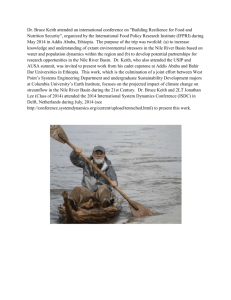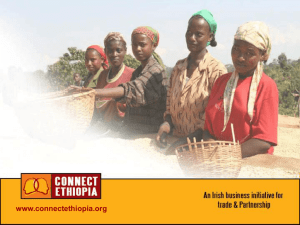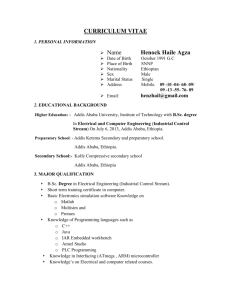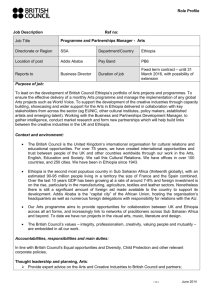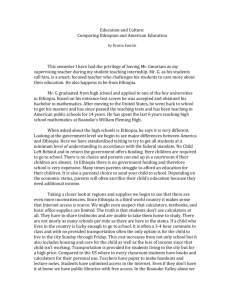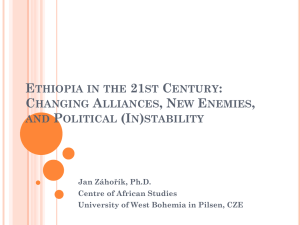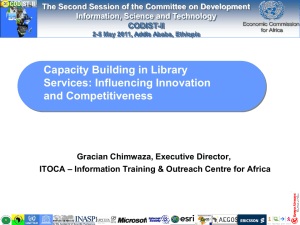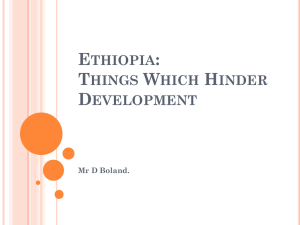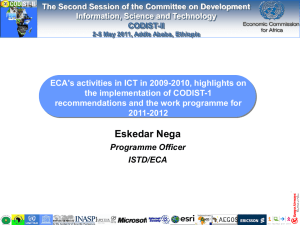Rift Valley field trip - School of Earth and Environment
advertisement
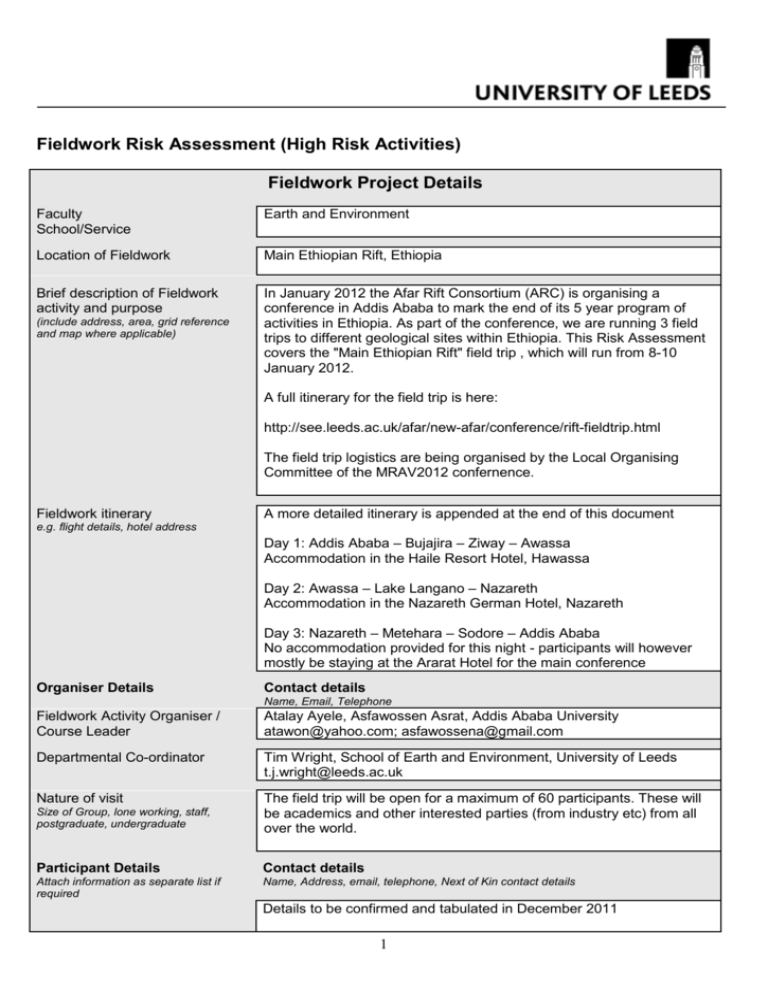
Fieldwork Risk Assessment (High Risk Activities) Fieldwork Project Details Faculty School/Service Earth and Environment Location of Fieldwork Main Ethiopian Rift, Ethiopia Brief description of Fieldwork activity and purpose In January 2012 the Afar Rift Consortium (ARC) is organising a conference in Addis Ababa to mark the end of its 5 year program of activities in Ethiopia. As part of the conference, we are running 3 field trips to different geological sites within Ethiopia. This Risk Assessment covers the "Main Ethiopian Rift" field trip , which will run from 8-10 January 2012. (include address, area, grid reference and map where applicable) A full itinerary for the field trip is here: http://see.leeds.ac.uk/afar/new-afar/conference/rift-fieldtrip.html The field trip logistics are being organised by the Local Organising Committee of the MRAV2012 confernence. Fieldwork itinerary A more detailed itinerary is appended at the end of this document e.g. flight details, hotel address Day 1: Addis Ababa – Bujajira – Ziway – Awassa Accommodation in the Haile Resort Hotel, Hawassa Day 2: Awassa – Lake Langano – Nazareth Accommodation in the Nazareth German Hotel, Nazareth Day 3: Nazareth – Metehara – Sodore – Addis Ababa No accommodation provided for this night - participants will however mostly be staying at the Ararat Hotel for the main conference Organiser Details Contact details Name, Email, Telephone Fieldwork Activity Organiser / Course Leader Atalay Ayele, Asfawossen Asrat, Addis Ababa University atawon@yahoo.com; asfawossena@gmail.com Departmental Co-ordinator Tim Wright, School of Earth and Environment, University of Leeds t.j.wright@leeds.ac.uk Nature of visit Size of Group, lone working, staff, postgraduate, undergraduate The field trip will be open for a maximum of 60 participants. These will be academics and other interested parties (from industry etc) from all over the world. Participant Details Contact details Attach information as separate list if required Name, Address, email, telephone, Next of Kin contact details Details to be confirmed and tabulated in December 2011 1 2 HAZARD IDENTICATION Identify all hazards specific to fieldwork trip and activities, describe existing control measures and identify any further measures required. HAZARD(S) IDENTIFIED CONTROL MEASURES (e.g. alternative work methods, training, supervision, protective equipment) Nature of the site School, college, university, remote area, laboratory, office, workshop, construction site, farm, etc A full itinerary is appended. For each day of the trip, a list of the nearest medical facilities is provided, along with their contact details. A variety of geological and tourist sites will be visited in the Main Ethiopian Rift. Environmental conditions Extremes of temperature, altitude, exposure to sunlight, potential weather conditions, tidal condition etc The field trip will begin on the plateau in Addis Ababa, at 2500 m, and will descend to just below 1000m in the rift valley. On day 3, the field trip will enter the southern part of Afar where the following conditions are possible: The extreme temperature and sun conditions will affect a short portion of the field trip. Plenty of water will be available. Participants have been made aware of the heat and strong sun and been sent a kit list before departure (HPF sun cream, appropriate clothing, ...). We mitigate the risk of extreme heat and high sunlight by ensuring that plenty of bottled drinking water is available for the party to drink 1. Extreme heat. Temperatures can reach 40 at mid day. 2. High levels of sunlight. For the rest of the trip, the temperatures may be hot, but should not be extreme. Site specific conditions e.g. cliffs, screes, bogs, featureless landscapes, local endemic infectious diseases, zoonoses etc Details of specific sites are appended. There should not be any long walks. Some sites have steep slopes or could be difficult underfoot. Some stops will be near dangerous roads. Details of individual sites are appended. Some specific mitigation measures are: 1. Steep slopes/cliff edges The field trip leaders will make participants aware of the potential dangers of specific sites, including steep drops. 2. Difficult underfoot conditions All participants will be instructed to bring good strong walking boots for the trip. 3. Roadside geology stops Some stops will be near roads. It is the responsibility of the field trip leaders to ensure that the party stops at safe locations and is alerted to the road hazard. Process Operating machinery, electrical equipment, driving vehicles, handling or working with animals etc n/a 3 Transport Mode of transport while on site, to and from site, carriage of dangerous goods etc Ethiopian roads and driving standards are generally poor. The route will include busy city and inter-city routes, as well as limited off-road routes. There will be some long drives (see appendix). Transport will be by two buses (~30-40 seats each). These are rented through the Ethio-der tour company. Each vehicle comes with a reliable and responsible professional driver. The vehicles will be checked by the field trip leaders before departure to ensure that they are of adequate standards. To minimise the risk of accident, drivers will be instructed to not drive for more than 3 hours without a break. They will be instructed not to exceed the speed limit and only to drive during the hours of daylight. Equipment manual handling risks, operation of machinery, tools, use of specialist equipment etc n/a Violence There are no specific risks here potential for violence (previous incidents etc) There is minimal potential for violence along the route of this field trip. Individual(s) medical condition(s), young, inexperienced, disabilities etc To mitigate against potential medical issues, each participant will be required to fill in a medical form, notifying us of any medical conditions. We do not at this stage know who will be on the field trip. Each participant is required to advise us on any specific medical conditions that may be relevant from a risk perspective. We reserve the right to refuse to take individuals if they are not deemed suitably fit for the trip. Work Pattern time and location e.g. shift work, work at night This work pattern does not introduce any particular additional concerns. Most days will consist of elements of driving and geological stops. Permissions Required n/a Contact details, restrictions and details of permissions None Other Specific Risk Assessments n/a e.g. COSHH, Manual Handling, Lone Working if so what is identified in these assessments? Are there training requirements? (cross reference where appropriate) 4 Health Questionnaire Completed Not required for this short trip. Is it required and has it been completed, who by and where is it recorded Health Surveillance Required n/a Is it required and has it been completed, who by and recorded Vaccinations Required Obtained and certificate where applicable A range of diseases are endemic within Ethiopia. Participants are advised to check with their local doctors before departure as to the exact vaccinations required. UK health agencies recommend the following need considering: Yellow fever Rabies Meningococcal Hepatitis B Malaria is endemic in parts of Afar and the Ethiopian Rift Valley. All participants are instructed to take anti-malarial drugs, and to use insect repellent with high percentage of DEET to avoid being bitten. Suffering from diarrhoea is also reasonably common. There is cholera reported on occasions. This will be treated by rehydration, and by use of antibiotics if symptoms do not diminish after 24 hours. It will be prevented by ensuring that food is thoroughly cooked, and that antibacterial soap/hand wash is used regularly. First Aid Provision Requirement for first aid or specialist first aid equipment, access to medical equipment and hospitals Medical provision is of an extremely poor standard, with the only good clinics being in Addis Ababa. At times the party may be 3 or 4 hours from professional medical care. For each day of the trip, the nearest medical facilities have been identified (see appendix). All participants will be required to show evidence that their insurance enables them to be evacuated from the region and country. Additional Supporting Information Pre-departure Briefing A full pre-departure briefing will be held in Addis Ababa. Carried out and attended Training Identify level and extent of information; instruction and training required consider experience of workers, details of relevant training We will ensure that two members of the party will be able to deliver basic first aid. Basic first aid training. 5 FCO advice Include current FCO advice for travel to the area where applicable Sub Saharan Africa Ethiopia Still current at: 09 December 2011 Updated: 17 November 2011 Avoid all but No essential restrictions in travel to this travel part(s) of advice country Avoid all but essential travel to whole country Avoid all travel to part(s) of country Avoid all travel to whole country This advice has been reviewed and reissued without amendment. The overall level of the advice has not changed; we continue to advise against all travel to specific areas of Ethiopia and against all but essential travel to Jijiga town. (see travel advice legal disclaimer) Travel advice for this country Travel Summary 6 Safety and security Local laws and customs Entry requirements Health General Travel Summary (back to top) We advise against all travel to: - within 10 km of the border areas with Eritrea, with the exception of the main road through Axum and Adigrat, and tourist sites close to the road (e.g. Debre Damo and Yeha - areas off the principal roads/towns within 10 kms of the borders with Sudan and Kenya - the Fik, Degehabur, Gode, Korahe and Warder zones of the Somali region where rebels groups are active and the situation remains volatile - within 10km of the Somalia border, except for the Jijjga and Shinile districts of the Somali region - the Danakil desert area bounded by the DessieAdigrat road; the Dessie-Djibouti road - the Gambella region outside of Gambella town itself For further details on the above recommendations, please see Safety and Security Terrorism/Security and Safety and Security - Local Travel. We advise against crossing the Ethiopia/Somalia or 7 Somaliland border by road. We advise against all but essential travel to Jijiga town. See Safety and Security Terrorism/Security and Safety and Security - Local Travel (North & East Ethiopia). There is generally a low level of crime but you should avoid any large gatherings and public demonstrations, both in Addis Ababa and in regional cities and towns. Visitors should be aware that very large crowds are common in cities and towns across Ethiopia on key national and religious dates, and should remain particularly vigilant. Pick pocketing is the main crime risk at such events. Claustrophobia may also affect some people. Specific dates of key national and religious events you should be aware of are listed below - please see the Terrorism/Security section. The Ethiopia-Eritrea border remains closed. Several security incidents have taken place along the border. The risk of cross-border tensions increasing and the security situation deteriorating very rapidly continues. There is a general threat from terrorism in Ethiopia; attacks could be indiscriminate including places frequented by expatriates and foreign travellers . If you wish to enter Ethiopia from Sudan in your own vehicles see Entry Requirements - Road Travel from Sudan into Ethiopia. Around20,000 people visited Ethiopia in the period 01 April 2010 - 31 March 2011. See General - Consular Assistance Statistics. Also see Safety and Security Crime. You should take out comprehensive travel and medical insurance before travelling. See General Insurance. 8 Safety and security (back to top) Safety and Security - Terrorism/Security There is a general threat from terrorism in Ethiopia; attacks could be indiscriminate including in places frequented by expatriates and foreign travellers. Visitors should remain vigilant at all times, especially in crowded areas and places frequented by foreigners, including hotels, restaurants and bars. There is security around all major hotels, key government offices and major Western Embassies in Addis Ababa. Security is occasionally increased around these sites, reflecting spikes in the threat. Visitors should remain vigilant at all times, especially in crowded areas (including bus stations) and places frequented by foreigners, including hotels, restaurants and bars. Increased security at the time of the AU Summit (usually every January/February) will lead to traffic congestion, including at major hotels. Visitors could also experience delays at the airport. Visitors should avoid any large gatherings and public demonstrations, both in Addis Ababa and in regional cities and towns. Visitors should be aware that very large crowds are common in cities and towns across Ethiopia on key national and religious dates, and should remain particularly vigilant. These dates include 7 January (Ethiopian Christmas); 19 January (Epiphany/”Timket”); 2 March (Victory of Adawa); 5 May (Ethiopian Patriots’ Victory Day); 28 May (Downfall of the Derg); 11 & 12 September (Ethiopian New Year); 27 September (The Finding of the True Cross/”Meskel”). The following religious events also draw very large crowds: Ethiopian Easter; Eid (End of Ramadan); Eid Al Arafa; The Birthday of the Prophet Mohammed. The specific dates of each of these events differ each year. Some may find the size of these crowds claustrophobic, especially given the fact that large numbers of people are tightly contained in a relatively small area. Pick pocketing is a risk. On 5 April 2010 a British national working for IMC Geophysics International in Warder Zone in the Somali region was killed when he was ambushed near to Danot town. The perpetrators of this attack are currently 9 unknown. On 14 December 2009 at around 19:00 there were two explosions in separate hotels in Kebridehar. It was reported that two people were killed and nine injured. Several suspects were caught. On 2 November 2009 two Save the Children vehicles were stopped and burnt in the Fik zone of the Somali Region. Passengers were inconvenienced but not harmed. The perpetrators of this remain unknown. On 15 January 2009 there was an explosion reported at the main bus station in the Mercato Market area of western Addis Ababa. Thirty two people were reported injured. Explosive devices, such as grenades, are readily obtainable throughout Ethiopia and are occasionally used during local disputes. There is a risk of British nationals and other foreigners becoming indiscriminately caught up in attacks. Remain extremely vigilant at all times in public places, particularly at transport hubs, and check this travel advice at regular intervals. There remains a risk of similar attacks on petrol stations. Because of ongoing military activity and lawlessness in the Somali region, we advise against all travel to the Fik, Degehabur, Gode, Korahe and Warder zones. We also advise against all but essential travel to Jijiga town, due to the risk of being caught up in local instability. We also recommend against overnight stays unless in secure accommodation. A number of incidents have taken place in the Somali region in recent years, including bombs and kidnappings in which foreigners have been caught up or targeted. The last two years, however, have seen a reduction in such incidents. There has been continuing unrest, sporadic violence, banditry and inter-tribal clashes in the West and South of the Gambella region. Although the situation is improving, it remains unpredictable and we advise against all travel outside of Gambella town. In the past, groups affiliated with terrorist organisations have also been active in other border states, including Tigray, Oromiya, 10 and Afar. You are reminded to remain vigilant with your personal security and to exercise caution. See our Terrorism Abroad page. Safety and Security - Crime Petty theft/mugging is common particularly in the Piazza or Mercato areas of Addis Ababa and is on the increase in other areas. You should exercise particular caution when visiting crowded public places and keep valuables, particularly cameras and passports out of sight. Be aware of bag and jewellery snatching, pick-pocketing and opportunistic snatching from vehicles stopped at traffic lights in Addis Ababa. See our Victims of Crime page. Safety and Security - Local Travel Independent travellers should keep themselves abreast of local and international news. You should avoid driving after dark in rural areas: vehicles often have no lights and livestock may be roaming the roads. This also presents a risk to pedestrians, who should remain vigilant at all times. Travellers should be aware that Health and Safety precautions, which would be standard in the UK (eg life jackets in boats, protective railings at historical sites), are rarely in place in Ethiopia. Safety and Security - North & East Ethiopia The Danakil desert: We advise against all travel to the Danakil desert bounded by the Dessie-Adigrat road, the Dessie-Djibouti road and the Ethiopian-Eritrean border. Police in the Afar Regional State confirmed that on Sunday, 08 May 2011 a truck that belonging to the Regional government hit a landmine at Kurri (aka: Korri) district, Zone 1 of the Afar Region. No causalities reported except damage on the truck. A number of landmines exploded in the Danakil in April 2009, including on the road between Afdera and Logia. A tourist vehicle travelling to Erta Ale 11 (the active volcano) hit a landmine on 15 April 2009, killing two Ethiopians and injuring a foreign tourist. On 1 March 2007, a group of western tourists and their tour guides were abducted by an armed group near Lake Asele in the Danakil Depression region in North Eastern Ethiopia. Five of those abducted were released on 13 March. The others were released on 23 April 2007. On 20 February 2008 the Ethiopian government reported that the police had foiled the attempted kidnap of a group of foreign tourists travelling in the region. Tigray and Afar: With the exception of the main roads through Axum and Adigrat,and tourist sites close to the road (e.g. Debre Damo and Yeha), we advise against all travel within 10 km of the Eritrean border in the Tigray and Afar regions. On 13 March 2009 eight people were killed and 11 seriously injured when a bomb exploded on a public bus travelling from Humera to Shire. Tensions between Ethiopia and Eritrea are high and the border remains closed. Since the relocation out of Eritrea of the UN Peacekeeping Mission (UNMEE) in March 2008, the risk of cross-border tensions increasing and the security situation deteriorating very rapidly has sharpened. Exercise extreme caution if you intend to travel on the road from Addis Ababa to Djibouti, including travelling via Asaita, due to its historically high number of road traffic accidents. Somali Region: We advise against crossing the Ethiopia/Somalia or Somaliland border by road. We advise against all travel to within 10km of the Somalia border, except for the Jijjga and Shinile districts of the Somali region. Since the mid-1990s, insurgent groups, some affiliated with terrorist organisations, have clashed with government forces in the Somali Region, particularly in the Ogaden. Since April 2007 there has been an increase in the violence. We advise against travel to the Fik, Degehabur, Gode, Korahe amd Warder zones of the region where rebels groups are active and the situation remains volatile. We also advise against all but essential travel to Jijiga town and recommend against overnight stays unless in secure accommodation. (See Terrorism/security section above). Safety and Security - South & West Ethiopia 12 We advise against all travel to areas off the principal roads/towns within 10 kms of the areas bordering Sudan and Kenya. Along the border with Kenya cross-border banditry related to the drought in the region have increased. Armed groups hostile to the Government of Ethiopia operate in several areas near the border with Kenya. If crossing into Kenya or Sudan, keep to the main road and seek advice from local authorities about travelling in convoy. If travelling overland to Kenya via Moyale, we recommend that you also consult the FCO Travel Advice for Kenya. Gambella: We continue to advise against all travel outside of Gambella town due to the risk of banditry and inter-tribal clashes in the West and South of Gambella region. The situation is improving but remains unpredictable (see Terrorism/Security section above). Safety and Security - Local Travel - Air Travel All airport departure taxes for international flights departing Ethiopia and for internal flights within Ethiopia are included in the price of airline tickets. See our Airline Security page. Safety and Security – Local Travel - Traffic accidents: Traffic accidents are a regular occurrence in Ethiopia and Addis Ababa specifically. If you are involved in a traffic accident you should remain with your vehicle and call the local police. You should avoid confrontation and await the arrival of the police to resolve the matter. Safety and Security - Political Situation Ethiopia Country Profile While the security situation is generally calm, there is a general risk of politically-motivated violence, whether in Addis Ababa or elsewhere in Ethiopia. You should avoid large public gatherings, remain vigilant in public places throughout the country (especially on national and religious days when large crowds gather) and 13 follow local and international news. You should register with the British Embassy in Addis Ababa on arrival to help ensure our consular and crisis staff can provide better assistance to you in an emergency. See Consular Registration below. Local laws and customs (back to top) The Ethiopian Highlands are predominantly Orthodox Christian with ‘fasting’ each Wednesday, Friday and during Lent when only vegetarian dishes are available (except in larger hotels). The Julian calendar is used and the current year is 2002. Christmas is celebrated on 7 January and New Year on 11 September. Some Ethiopians set their clocks from dawn to dusk and there is a six-hour difference between Ethiopian time and Western time i.e. 6 o’clock can mean 12 o’clock. So take care when making appointments. There is a large Muslim population and generally Ethiopians dress in a conservative manner. You should respect local traditions, customs, laws and religions at all times and be aware of your actions to ensure that they do not offend other cultures or religious beliefs, especially during the holy month of Ramadan or if you intend to visit religious areas. See our Travelling During Ramadan page. Ethiopian antiques need an export certificate to be taken out of the country. Major tourist outlets in Addis Ababa can offer assistance in obtaining one. Homosexual acts (applying to both sexes) are illegal, and carry penalties of between one and fifteen years imprisonment. Drug offences are treated seriously in Ethiopia. You should not become involved with drugs of any kind. Travellers should be aware that it is illegal to carry more than 200 birr when entering or departing Ethiopia. If you are found to be carrying in excess of 200 birr when passing through immigration you may be subject to prosecution. The penalties are tough - the money will be seized and a prison sentence is possible. 14 Visitors to Ethiopia must declare to customs officials at their point of entry any cash in excess of $3000 (or the equivalent in other foreign currencies). This must be done by completing a customs declaration form. Travellers departing Ethiopia in possession of more than $3000 must present a bank advice notice to customs officials if the currency was purchased from a local bank. Alternatively, the traveller must present a valid customs declaration form obtained at their point of entry. Travellers should be aware, however, that a bank advice notice or customs declaration form becomes invalid if 45 days or more have elapsed since the date of issue. For more detailed information please visit: http://www.erca.gov.et/TRAVELERSDOLLARS.pdf. See our Your trip page. Entry requirements (back to top) Entry Requirements - Visas British nationals require a visa to enter Ethiopia. If you are flying into Ethiopia for as a tourist you may obtain your visa on arrival at Addis Ababa (Bole) and Dire Dawa International airports. If you are arriving by other means, or at another airport, you must obtain a visa prior to arrival, even when travelling from countries without an Ethiopian Embassy or Mission. Visa applicants in the United Kingdom should contact the Embassy of the Federal Democratic Republic of Ethiopia in London. Penalties for overstaying your visa can be severe (see below - Immgration Status). Entry Requirements – Road Travel from Sudan into Ethiopia British nationals wishing to enter Ethiopia from Sudan in their own vehicles require a letter from the British Embassy in Addis Ababa providing details of the passengers (names, passport details) and vehicle(s) (make, model, registration number, engine and chassis numbers). They should contact the British Embassy in Addis Ababa (addis.consular@fco.gov.uk) well in advance of their journey to request a copy of the letter and provide full details of their vehicle, passengers and voyage. This letter should be presented to officials of the Ethiopian Revenue and 15 Customs Authority at the border. Entry Requirements - Passport validity You must hold a valid passport to enter Ethiopia. Your passport must be valid for the proposed duration of your stay. No additional period of validity beyond this is required. However, it is always sensible to have a short period of extra validity on your passport in case of any unforeseen delays to your departure. You do not have to wait until your old passport expires to apply to renew it. Any time left on your old passport when you apply will be added to your new passport, up to a maximum of nine months. For passport applications in the UK, you should apply to the Identity and Passport Service. Entry Requirements - Yellow Fever Certificate Yellow Fever vaccination certificates may be required for visitors from countries where it is endemic. Visitors to Ethiopia may be required to produce a yellow fever certificate upon arrival in a third country, following a stay in Ethiopia. Entry Requirements - Travelling with children For information on exactly what will be required at immigration, please contact the Embassy of the Federal Democratic Republic of Ethiopia in London. Entry Requirements- Immigration status Visitors to Ethiopia should be aware that they cannot change their immigration status once in Ethiopia. If visitors to Ethiopia have any concerns regarding their immigration status they should contact the local immigration authorities at Security, Immigration and Refugee Affairs Authority P.O.Box 5741 Addis Ababa Ethiopia Tel: (+251-11) 1553899 Fax: (+251-11) 1553209 Tourist visitors to Ethiopia should be aware that they will be unable to take employment, including voluntary employment, 16 whilst visiting Ethiopia on a tourist visa. If visitors are caught in breach of their immigration status they may face severe fines or possible imprisonment. Health (back to top) There are a number of hospitals in Addis Ababa but only private hospitals offer a reasonable standard of basic care for minor health problems. Elsewhere medical facilities (including dentistry) are extremely poor. Water-borne diseases and malaria are common to Ethiopia, the latter in areas of the country below 2000 metres. Bilharzia is present in the majority of lakes in Ethiopia. Since August 2006 there have been approximately 60,000 reported cases of Acute Watery Diarrhoea resulting in about 600 deaths. Drink or use only boiled or bottled water and avoid ice in drinks. If you suffer from diarrhoea during a visit to Ethiopia you should seek immediate medical attention. Addis Ababa sits at 2,400 metres above sea level. Adjusting to the altitude may take several weeks. If you have a heart condition you should seek medical advice before travelling to Addis Ababa. You should exercise normal precautions to avoid exposure to HIV/AIDs. See our HIV and AIDS page. Seek medical advice before travelling to Ethiopia and ensure that all appropriate vaccinations are up to date. For further information on vaccination requirements, health outbreaks and general disease protection and prevention you should check the websites of the National Travel Health Network and Centre NaTHNaC and NHS Scotland's Fit For Travel or call NHS Direct on 0845 46 47. See our Travel Health page. General 17 (back to top) General - Insurance Ensure that you obtain adequate medical insurance before arrival. You should also carry a comprehensive medical pack when travelling out of Addis Ababa. Medical insurance should cover the cost of air ambulance evacuation out of Ethiopia in the event of serious accident or illness. Check any exclusions, and that your policy covers you for the activities you want to undertake. See our Travel Insurance page. If things do go wrong when you are overseas then see our When things go wrong page. General - Consular registration If you are visiting Ethiopia either on a long or short-term basis you should register with the British Embassy in Addis Ababa on arrival so our consular and crisis staff can provide better assistance to you in an emergency. Full details are on the Embassy website. General - Money Credit cards are accepted at only a very few outlets in Addis Ababa. It is not normally possible to obtain currency advances against a credit card in Ethiopia. Ensure you have an adequate supply of hard currency or travellers-cheques. General - Consular Assistance Statistics Approximately 20,000 visited Ethiopia in the period 1 April 2010 and 31 March 2011 (source: Ethiopian Ministry of Culture and Tourism). During this period 21 British nationals required consular assistance in Ethiopia, for the following types of incident: four deaths; two hospitalisations; and six arrests for a variety of offences Supervision Identify level of supervision required e.g. full time, Periodic telephone/radio contact The trip will be run by Atalay Ayele and Asfawossen Asrat. They both have extensive experience in the field in Ethiopia. 18 The group will ensure a daily contact with the Addis Ababa capital. Mobile phone will be available for more than 90% of the field trip, and one satellite phone will taken for other emergencies. Other Controls All participants will be advised to register with their embassy on arrival in Ethiopia. e.g. background checks for site visits, embassy registration Identify Persons at Risk n/a This may include more individuals than the fieldwork participants e.g. other employees of partner organisations Copy of other Organisation’s risk assessment attached? Additional Information Relevant to the one working activity including existing control measures; information instruction and training received, supervision, security, increased lighting, emergency procedures, access to potable water etc. Residual Risk Yes Is the residual risk acceptable with the identified controls? No Name: Assessment carried out by Signature: Date: Names of person(s) involved in Fieldwork N.B: This can take the form of a signed class register when large group work Name: Signature: Date: Name: Fieldwork Activity Organiser / Course Leader e.g. PI, etc Signature: Date: 19 Appendix 1. Detailed Itinerary This appendix identifies some of the major stops on the field trip, along with their coordinates. There may be additional stops between these major localities, and the details of specific sites are subject to change due to adverse weather, security, or other local information. Day: 1 Communication: Mobile Site: Addis Ababa – Bujajira – Coordinates: 38.7E, 9.0N to 38.5E, Ziway – Awassa 7.1N Hospital/Clinic: Addis Ababa Clinic (up to 4 hours drive) Nazret (up to 3 hours drive) Stop 1: Melka Kunture Archaeological Site (45 Km from Addis): visit of the museum and open air museum (excavation site). No particular risk Stop 2: Tiya Stelea Site (UNESCO World Heritage Site, 85 km from Addis). No particular risk. Stop 3: At the Rift Margin 2 km south of Tiya: discussion of the western rift margin (view to the west) and the Debre Zeit Silti volcantectonic zone (view to the South east). Roadside stop. Fieldtrip leaders to ensure stop is safe from traffic. Stop 4: Butajira (Coffe/tea/toilet break, 133 km from Addis): at Rediet Hotel. No particular risk. Stop 5: At Gademota ridge (radio station), along the Butajira-Ziway road: a major silicic centre with a great view to the east. Roadside stop. Fieldtrip leaders to ensure stop is safe from traffic. Stop 6: Hareshetan Lake (a maar a few km south of Butajira) along the Silti volcanic line. Roadside stop. Fieldtrip leaders to ensure stop is safe from traffic. Potentially slippy underfoot. Stop 7: Abiyata Shalla lakes National park (along the Ziway-Hawassa road): Drive into the park till the viewpoint to the Abiyata and Shalla lakes. Lunch picnic at the view point. No particular risk. Day: 2 Communication: Mobile Site: Awassa – Lake Langano – Coordinates: 38.5E, 7.1N to Nazret 39.25E, 8.5N Hospital/Clinic: Addis Ababa Clinic (up to 4 hours drive) Nazret (up to 3 hours drive) Stop 1: The Bulbula section: rift sedimentation process. No particular risk. Stop 2: Ogolcho (along the Meki-Assela road): silicic centres, view towards the eastern rift margin and discussion. Roadside stop. Fieldtrip leaders to ensure stop is safe from traffic. Stop 3: 5 km south of Kulumsa section (view towards the Rift margin faults) and discussion about rift tectonics. No particular risk. Stop 4: The Kulumsa section. The major eastern rift margin and the Wonji Fault Belt. No particular risk. Stop 5: Asslea (Coffee/tea/toilet break): at Derartu Hotel. No risk Stop 6: Keleta section and view towards Sire. No particular risk. Day: 3 Communication: Mobile/Satellite Site: Nazret – Metehara – Sodore Coordinates: 39.25E, 8.5N to – Addis Ababa 38.7E, 9.0N Hospital/Clinic: Addis Ababa Clinic (up to 3 hours drive) Nazret (up to 2 hours drive) Stop 1: Kone caldera. A dormant volcano intersected by the (quiet) main road. Particular hazards are road traffic and steep slopes. These hazards will be mitigated by ensuring off-road parking and that the group stays away from the caldera cliff edges. Stop 2: The Metahara fissures. Site is next to a lake. Large open fissures and tilted fault blocks can be seen. Care must be taken as the ground can be rough underfoot and to avoid falling into a fissure. Crocodiles are 20 present in the lake, but should disperse on hearing loud noises. The group should stay together and make plenty of noise. Other stops may be taken along the route. Care will be taken by the field trip leaders to ensure that they are safe. The main risk on this day is that of driving in the dark. This should be avoided, and will require the field trip to depart the field areas in plenty of time to return to Addis in daylight. 21 Appendix 2 - Contact details for Hospitals / Clinics. Our local coordinator will provide a complete list which will be added shortly. 22 Appendix 3 - List of medication / personal first aid equipment recommended. Some of these are only available by prescription in the UK. Imodium Diaralyte or similar rehydration salts Antiseptic wipes / cream Wound closure strips Miolin and tape Miconazole cream Assorted plasters Paracetamol / Ibuprofen or similar Ciproflaxin (for stomach upsets) Malarone (anti-malarials) 23
